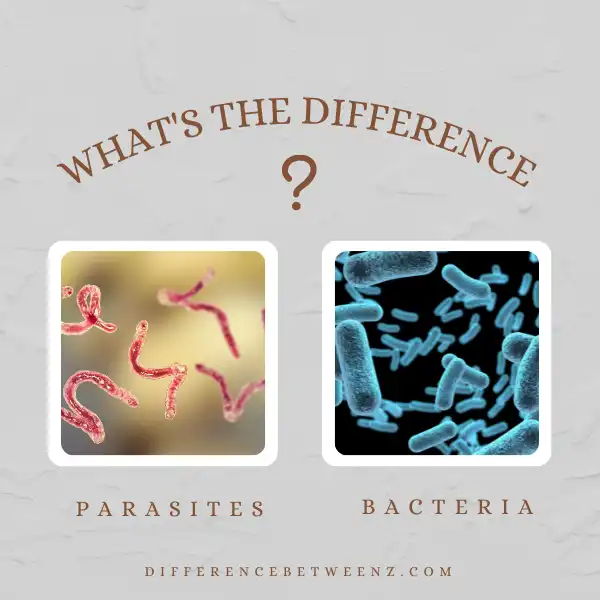Bacteria and parasites are both microorganisms that can cause infections in humans, but there are some key differences between them. Bacteria are single-celled organisms that can be found all around us, while parasites are more complex and evolved organisms. Bacteria can cause a variety of illnesses, such as pneumonia or meningitis, while parasites tend to only cause one or a few types of diseases. In general, bacteria are easier to treat than parasites, because antibiotics work against them. Parasitic infections often require more specific medications or even surgery in order to cure them.
What is Parasite?
- A parasite is an organism that lives on or in a host and gets its food from or at the expense of its host. A few examples of parasites are tapeworms, fleas, and ticks. Most parasites cause disease in their hosts. The branch of medicine that deals with parasites and the diseases they cause is called parasitology. An expert in this field is called a parasitologist.
- Some parasites live inside the bodies of people or animals. These are called endoparasites. Examples of endoparasites include certain worms that live in the intestines (such as tapeworms), and protozoans (such as amoebas) that may live in the blood, tissues, or organs. Other parasites live on the surface of people or animals.
- These are called ectoparasites. Examples of ectoparasites include lice, fleas, bedbugs, and mites. Most parasites cause disease because they compete with their hosts for food or destroy their hosts’ tissue while feeding on them. In some cases, a person may be infected by a parasite but not develop any symptoms of illness (asymptomatic infection).
What is Bacteria?
- Bacteria are small, single-celled organisms that can be found in nearly every environment on Earth. While many people associate bacteria with illness and disease, the vast majority of bacterial species are benign or even beneficial to humans. In fact, we have evolved to depend on certain types of bacteria for tasks like digesting food and synthesizing vitamins.
- Bacteria are classified as prokaryotes, meaning that they lack a membrane-bound nucleus and other organelles found in eukaryotic cells. Instead, their genetic material is housed in a single circular chromosome that is located in the center of the cell. Bacteria can reproduce quickly, and they often form colonies composed of millions of cells.
- When conditions become unfavorable, some species of bacteria can enter a dormant state known as spores, which makes them resistant to extreme temperatures and other harsh conditions. Given their great adaptability and ability to thrive in diverse environments, it is not surprising that bacteria are among the oldest and most successful forms of life on Earth.
Difference between Parasites and Bacteria
Though they are both tiny organisms that can cause harm to humans, there are several key distinctions between parasites and bacteria.
- Most importantly, parasites rely on host cells in order to survive, whereas bacteria can exist independently.
- Additionally, parasites are usually much larger than bacteria, and they often have complex life cycles that involve multiple hosts.
- Finally, while bacteria frequently cause infections, parasites typically only cause disease when they are present in large numbers.
These differences may seem small, but they are essential for understanding the unique ways in which these two types of organisms can cause harm to humans.
Conclusion
So, what’s the difference between parasites and bacteria? The main difference is that parasites are able to live inside of their host, whereas bacteria can only survive on the surface. Parasites typically have an intimate relationship with their hosts, often invading and living in specific organs or tissues. Bacteria, on the other hand, are much less discriminating and will invade almost any area of the body. Additionally, parasites typically cause more serious health problems than bacteria do. Although both can make you sick if you get infected, parasites are generally considered to be more dangerous because they can linger in your body for long periods of time without being killed by antibiotics.


